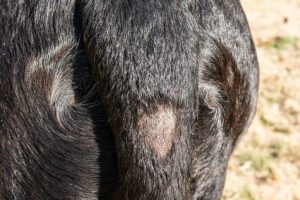Dog Hair Loss in Port St. Lucie, FL. – 10 Common signs
Dog hair loss, also known as alopecia, is a common problem that can be caused by a variety of factors. As pet owners, it’s crucial to understand the possible causes and know when to seek professional help.

What is Alopecia in Dogs?
Alopecia is the partial or complete loss of hair in areas where it’s usually present. This widespread issue can affect dogs of all breeds, sizes, and ages. While shedding is normal for dogs, hair loss that results in bald patches or thinning hair may be a sign of underlying health issues.
Symptoms to Watch Out For
Besides the evident hair loss, other symptoms may accompany alopecia. These can include skin redness, swelling, or lesions; changes in behavior, such as increased agitation or lethargy; and changes in appetite or weight. Monitoring your dog for these signs is an essential part of pet ownership.
A Deeper Look at the Top 10 Causes
Understanding what causes hair loss in your dog can help you take the necessary steps towards treatment and prevention.
Allergies
Allergies, whether food or environmental, can cause a dog’s skin to become inflamed, itchy, and sensitive, leading to hair loss from excessive scratching or licking.
Parasitic Infestations
Parasites like fleas, mites, and ticks can cause intense itching in dogs, leading to hair loss due to constant scratching and biting at the skin.
Fungal Infections
Fungal infections like ringworm can cause round, patchy hair loss with a red mark in the center.
Hormonal Disorders
Conditions like hypothyroidism and Cushing’s disease can cause hair loss in dogs. These conditions alter the body’s hormone production, which can affect skin health and hair growth.
Inadequate Nutrition
Proper nutrition is vital for a healthy coat. Diets lacking essential nutrients like vitamins, minerals, and protein can lead to dull coats and hair loss.
Stress and Anxiety
Stress and anxiety can lead to compulsive behaviors such as excessive licking and scratching, which can cause hair loss.
Hereditary Factors
Certain breeds are predisposed to specific skin conditions and types of alopecia.
Aging
As dogs age, their skin can become thinner and their hair can fall out more easily, leading to hair loss.
Sunburn
Dogs, especially those with thin or light-colored coats, can get sunburns, which can cause hair loss.
Medical Treatments and Medication
Certain medical treatments, like chemotherapy, or the use of specific drugs can cause dogs to lose hair.
How to Handle Hair Loss in Dogs: A Guide for Worried Owners
Seeing your furry friend lose their hair can be distressing, but understanding the problem and knowing how to address it can significantly ease your worry.
Home Management Techniques
Regular grooming can help you monitor your dog’s skin and hair health closely. Ensure they have a balanced diet and protect them from excessive sun exposure. Regular exercise and mental stimulation can also help reduce stress levels.
When to Seek Professional Help
If you notice your dog is losing hair excessively, it’s crucial to consult a veterinarian. In some cases, hair loss can be a symptom of a more serious underlying condition. A veterinarian can provide a proper diagnosis and treatment plan.
Advanced Treatment Options
In the case of chronic or severe conditions, advanced treatment options may be necessary. This could include allergy testing, hormonal therapy, or even surgery.
Ensuring Your Dog’s Health with the Veterinary Medical Center of St. Lucie County
At the Veterinary Medical Center of St. Lucie County, we understand how much your furry friend means to you. We’re committed to offering the best care and treatment options for a wide range of canine conditions, including hair loss.
Our professional and dedicated team is always ready to help you understand your pet’s health and ensure they live a happy and healthy life. If you’re concerned about hair loss in your dog, call us at (772) 337-8570 or schedule an appointment online.
For more information about our services, visit our website. Remember, early detection and intervention are key to handling hair loss in dogs, and we’re here to assist you every step of the way.
